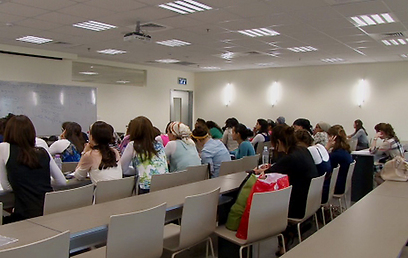
But apparently not all graduates find jobs easily once they graduate, and many obstacles stand in their way. One student confessed she was afraid that even though she was about to graduate with honors, her chances of finding employment are slim. Another student says that in his class "only eight students found internships out of 120 students."
Related stories:
- AG reverses gender-biased student elections clause
- In praise of Torah studies
- Haredim registered in yeshivas, working on the sly
- Bezalel arts school to launch haredi program
"Instead of blaming the entire haredi population as being damaged and as indicative of failed economic and social policies, decision makers must change their perception and start encouraging haredim to attend universities as the first and most important step towards integrating the haredi population into the job market," says Prof. Yaron Zelekha, former Accountant General of the Israeli Finance Ministry and head of the Accounting Department in the Ono Academic College.
Subsidizing tuition
"The Ono Academic College has been active on this national issue on its own for over a decade, but we'd be happy to no longer constitute as a monopoly," Zelekha says. "The state should start pulling its weight in funding degrees for haredim who are in need of scholarships, rather than leaving it to the hands of the college," Zelekha concludes.
The college initiated haredi-tailored classes and study programs as part of the institution's focus on social activism within Israel. In fact, the studies of the haredi program are not held in the Kiryat Ono campus, but in two campuses – one in the city of Or Yehuda, which instates separate days of study for men and women, and one in Jerusalem.

A class of haredi women (Photo: Eli Mandelbaum)
The number of haredi students currently amounts to 2,500: 1,400 men and 1,100 women, and has 1965 graduates.
For those who do not have a high-school diploma, the college offers classes in math and English; subjects that haredi students are usually not taught in high-school.
Most popular subjects: Law and accounting
The haredi campus offers a degree in law, accounting, and business management, all of which can be practiced without giving up the haredim's daily ritual of Torah study, and are therefore in great demand.
Amiel Kastoriano, who graduated from the law program and is now an independent lawyer, wanted to clarify that "contrary to what is usually illustrated in the media, the haredi reality is not as is it appears; there is great demand for professional training among haredim."
Torah and work
"There is no doubt that in order to sustain a just world, people must work for a living," says Shalom Wisner, an independent haredi accountant. "The necessity of making a living is obvious to all in the material sense, and obvious to Torah-scholars in the spiritual sense," Wisner says. According to the Mishnah "all study of the Torah that is not accompanied by work is futile and leads to sin".
Not an initiative of current political discourse
Renan Hartman, founder and chair of the Ono Academic College clarified that the college's work with haredi students is not a result of the current public debate on the issue. "Our academic vision includes changing the face of society," Hartman says. "We want haredim to stay haredi and still be able to pay their own way, without depending on government funds." The only way to promote an issue is to create a discussion among equals and to accept one another – to accept the haredi as haredi and the Arab as Arab. This way, they will accept us as secular Israelis," Hartman says.
Coming soon: Haredi students in Netanya
The Academic College in Netanya has also started to promote higher education of haredim. "The Israeli Council for Higher Education has recently permitted the Netanya College to open study programs for the haredi population in the subjects of banking and behavioral studies," says Prof. Zvi Arad, president of the Netanya Academic College. "Since the approval, we've been working vigorously to construct a suitable preliminary program to prepare haredi students for academic studies."
At the same time, we are working with banks and insurance companies in an attempt to integrate future haredi graduates in the job market. Making academia accessible to the haredim should be at the top of national interests, since integrating haredim in the job market will decrease taxes, increase economic growth, and contribute to national security," Arad says.
"Furthermore, integrating haredim in academia can contribute to the haredi community and allow for a full integration in the Israeli society, in all aspects," Arad concludes.
- Eli Mandelbaum contributed to this report
- Receive Ynetnews updates
directly to your desktop















